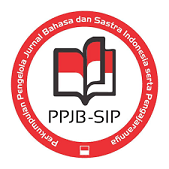ANALISIS RETORIKA CALON GUBERNUR PADA DEBAT PEMILIHAN GUBERNUR DKI JAKARTA TAHUN 2017
DOI:
https://doi.org/10.23887/jjpbs.v7i2.12414Abstract
Penelitian ini bertujuan untuk (1) mendeskripsikan pengorganisasian tuturan calon gubernur pada Debat Pemilihan Calon Gubernur DKI Jakarta Tahun 2017, (2) mendeskripsikan pemilihan kata calon gubernur pada Debat Pemilihan Calon Gubernur DKI Jakarta Tahun 2017. Penelitian ini merupakan penelitian deskriptif kualitatif. Subjek penelitian ini adalah calon gubernur dalam debat pemilihan gubernur DKI Jakarta tahun 2017 sedangkan objeknya adalah retorika calon gubernur dalam debat pemilihan gubernur DKI Jakarta tahun 2017. Penelitian dibatasi pada pengorganisasian tuturan dan pemilihan kata. Penelitian ini menggunakan metode dokumentasi dan instrumen penelitian menggunakan kartu data. Terkait dengan pengorganisasian tuturan, hasil penelitian ini menunjukan bahwa saat berbicara, penutur menerapkan empat aspek pengorganisasian tuturan, yang meliputi organisasi tuturan (bagian awal, bagian tengah, bagian akhir), prinsip organisasi tuturan (prinsip kesatuan, prinsip koherensi, prinsip penekanan), pola organisasi tuturan (pola topikal, pola pemecahan masalah, dan pola sebab-akibat), dan pengembangan tuturan (teknik induktif, teknik deduktif, teknik sebab-akibat, teknik narasi, teknik analogi teknik klimaks, teknik menjelaskan dasar sebelum atau sesudah pernyataan). Terkait dengan pemilihan kata, hasil penelitian ini menunjukkan bahwa penutur menerapkan aspek pemilihan kata yang meliputi penggunaan kata yang jelas (menggunakan kata-kata yang spesifik, menggunakan kata-kata sederhana, dan menggunakan kata secara hemat), penggunaan kata yang tepat, dan penggunaan kata yang menarik (memilih kata yang langsung menyentuh diri mitra tutur, menggunakan kata yang berona, dan menggunakan kata-kata tindak).Kata Kunci : Calon Gubernur DKI Jakarta, pengorganisasian tuturan, pemilihan kata
This study aimed to 1) to describe the governor’s candidate’s organized speaking in debate of DKI Jakarta Governor’s candidate year 2017. 2) to describe the governor’s candidate’s word choice in debate of DKI Jakarta Governor’s candidate year 2017. This study was descriptive qualitative study. The subject of this study was the governor’s candidate in debate of DKI Jakarta Governor’s candidate year 2017 and the object of this study was the rhetoric of governor’s candidate in debate of DKI Jakarta Governor’s candidate year 2017. This study focused on organized speaking and word choice. The method of this study was documentation and the instrument of this study was the data card. In terms of organized speaking, the result of this study showed that the subject used 4 aspects in organized speaking. There were organized speaking (beginning, whilst, ending), principle of organized speaking (unity, coherence, emphasizing), the pattern of organized speaking (topical pattern, problem-solving pattern and cause-effect pattern), and speaking development (inductive, deductive, cause-effect, narrative, climax technique analogy, explaining before and after statement). In terms of word choice, the result showed that there were some aspects of word choice which were used such as clear words (specific, simple and effective), accurate word and interesting word (sensitive words, attractive words and action words).
keyword : DKI Jakarta Governor’s candidate, Organized speaking, Word choice
Published
2017-10-27
Issue
Section
Articles
License
Authors who publish with the Jurnal Pendidikan Bahasa dan Sastra Indonesia Undiksha agree to the following terms:- Authors retain copyright and grant the journal the right of first publication with the work simultaneously licensed under a Creative Commons Attribution License (CC BY-SA 4.0) that allows others to share the work with an acknowledgment of the work's authorship and initial publication in this journal
- Authors are able to enter into separate, additional contractual arrangements for the non-exclusive distribution of the journal's published version of the work (e.g., post it to an institutional repository or publish it in a book), with an acknowledgment of its initial publication in this journal.
- Authors are permitted and encouraged to post their work online (e.g., in institutional repositories or on their website) prior to and during the submission process, as it can lead to productive exchanges, as well as earlier and greater citation of published work. (See The Effect of Open Access)







